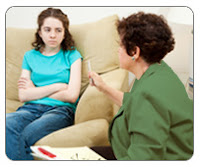Question
I’m a family therapist who is in the beginning stages of learning how to counsel Aspergers clients, specifically children between the ages of 5 and 12. What is the main thing I need to look for in working with these children.
Answer
 One main issue that comes up routinely in therapy for Aspergers (high functioning autistic) children and teens is "social skills deficits." There are three broad categories into which we can classify social deficits:
One main issue that comes up routinely in therapy for Aspergers (high functioning autistic) children and teens is "social skills deficits." There are three broad categories into which we can classify social deficits:
 One main issue that comes up routinely in therapy for Aspergers (high functioning autistic) children and teens is "social skills deficits." There are three broad categories into which we can classify social deficits:
One main issue that comes up routinely in therapy for Aspergers (high functioning autistic) children and teens is "social skills deficits." There are three broad categories into which we can classify social deficits:
1. Social awkwardness -- Socially awkward Aspergers kids are typically higher functioning children who may try very hard to gain and keep friends, but are hindered due to:
- focusing on their favorite topic or topics to the exclusion of most everything else
- an inability to learn social skills and taboos by observing others
- a lack of reciprocity in conversation and interest
2. Social avoidance -- Children who would fall into the category of socially avoidant might be those who tantrum, shy away from, or attempt to escape from social situations. Often, children that are this avoidant of social situations are doing so because they have some hypersensitivity to certain sensory stimuli. Consequently, those sensory needs must be addressed prior to attempts at teaching social skills. A kid who is constantly overwhelmed by his environment is likely not going to be successful in many interventions.
3. Social indifference -- Social indifference is the social impairment common to the majority of Aspergers kids. Kids who are socially indifferent are those who do not actively seek social interaction, but at the same time, do not aggressively avoid such interaction.
So, in addressing social skills deficits, it is helpful to know the child's social style (i.e., awkwardness, avoidance, indifference).

.jpg)


